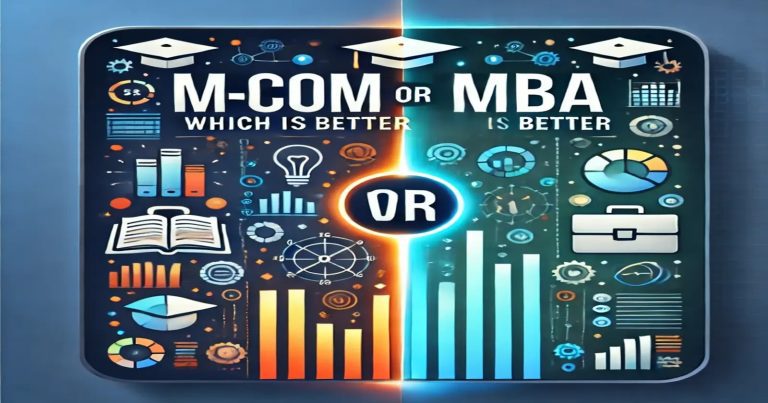The rapid growth of the world economy has created a wealth of possibilities for students seeking higher education in commerce and management. Nevertheless, deciding whether to pursue an M com or MBA which is better, continues to be a critical one for commerce graduates. MCom is a conventional research-oriented qualification that teaches the student the necessary depth of knowledge about the core commerce fields of finance, taxation, and accounting. In contrast, MBA is an innovative and grounded degree program centered around business strategy, leadership, and organizational management.
M Com
Master of Commerce (MCom) is a postgraduate course that extends the bachelor’s program in commerce, such as the Bachelor of Commerce (BCom). This two-year course is suited for learners who know how to work in accountancy, finance, taxation, banking, and economics. Ultimately, it is built around intense research and conceptual understanding, so it is particularly suited for students wanting a career in academia or specialized work within commerce.
MCom is the most widely pursued for students who intend to teach in academia or any other fields of chartered accountancy and financial consultancy. As per the course, it also overlaps with the competitive exams for jobs in the government sector related to banking and finance. The MCom course combines the theory and techniques of the subject to provide the students with a sound knowledge of commerce and finance. Core courses provide necessary knowledge, while electives enable specialization.
MBA
Unlike MCom (research-oriented), MBA (practice-oriented) is designed to provide creative answers to business problems. The program emphasizes case studies, internships, and hands-on projects. MBA students are presented with various business situations, such that they can learn to think strategically, solve problems, and lead. Executed with many specializations, an MBA equips students with the necessary skills for success in marketing, technology, consulting, and entrepreneurship. MBA programs are also well known for being flexible and delivering many specializations. Students can have a more general MBA or a specialization in a particular field to help them match their learning with their career aspirations.
Top Reasons to Pursue an MCom Degree
MCom is a beneficial course of study for students who aim to develop their knowledge in the commerce-based field of business. The program centers around developing theoretical knowledge, research, and expertise and is appropriate for academia and governmental work.
- The MBA is designed to train leadership skills and prepare you for decision-making in the corporate world.
- MBA graduates can work in diverse industries such as consulting, finance, marketing, and technology.
- MBA graduates command a higher pay scale because they are equipped with management and problem-solving skills.
- An MBA opens up an enormous alumni network, peers, and industry professionals, which is very beneficial for networking for a career.
- Therefore, top MBA programs are recognized worldwide and can provide the opportunity for an international career journey.
Top Reasons to Pursue MBA Degree
MBA courses are a good fit for those aspiring for organizational leadership, their businesses, or high-paying managerial employment. The level of preparation teaches you practical skills, strategic thinking, and leadership skills.
- The MBA is designed to train leadership skills and prepare you for decision-making in the corporate world.
- MBA graduates can work in diverse industries like consulting, finance, marketing, and technology.
- MBA graduates typically earn higher salaries due to their expertise in management and problem-solving.
- An MBA unlocks an extensive alumni network, peers, and industry professionals, which is invaluable for career networking.
- Hence, top MBA programs are internationally recognized and can provide access to a global career journey.
Career Options After MCom
MCom graduates are offered a variety of avenues to pursue in academia, government bodies, and the corporate sector. Their profound knowledge in commerce and finance makes them qualified to be involved in niche areas.
- Academia and Research: Teaching roles in colleges or research analyst positions.
- Government Jobs: Opportunities in the public sector banks, tax authorities and regulatory bodies.
- Finance and Accounting: Financial analyst, auditor, or tax consultant roles.
- Corporate Sector: Positions in payroll management, compliance, and accounting departments.
Career Options After MBA
MBA graduates are trained for leadership roles and premium-paying jobs in any field. Practical and networking skills are both special aspects of the program. Hence, the program is very adaptive.
- Corporate Leadership: Roles like CEO, COO, or Marketing Manager.
- Consulting: Business consultants solve complex challenges for companies.
- Entrepreneurship: Many MBA graduates successfully launch their own startups.
- Industry-Specific Roles: However, graduates can work in various sectors, including human resources (HR), IT management, or supply chain management, depending on their field of study.
M COM or MBA Which Is Better
Choosing between an MCom and an MBA is tricky as they both apply to different career aspirations with different consequences. Although MCom involves high theoretical knowledge of commerce and finance, an MBA equips students to lead and manage with a business skills-centered emphasis. Following is a comprehensive comparison between MCom and MBA to highlight their key distinctions.
| Aspect | MCom | MBA |
| Full Form | Master of Commerce | Master of Business Administration |
| Primary Focus | Theoretical knowledge in commerce, finance, and accounting. | Practical knowledge in business management and leadership. |
| Duration | 2 years | 1-2 years (varies by institution and program) |
| Eligibility | BCom or equivalent degree | Bachelor’s degree in any field (often with work experience) |
| Specializations | Finance, Taxation, Accounting, Economics | Marketing, Finance, HR, IT, Operations, Entrepreneurship |
| Key Subjects | Advanced Accounting, Financial Management, Business Statistics, Taxation, Economics. | Organizational Behavior, Business Strategy, Marketing, Financial Accounting, Leadership |
| Career Opportunities | Academic roles, research, government jobs, consultancy | Leadership roles, corporate management, entrepreneurship, consulting |
| Salary Potential | Moderate, depends on field and specialization | High, especially for leadership and managerial roles |
| Cost of Education | Affordable, usually lower than MBA | Expensive, especially at top-tier institutions |
| Best For | Students aiming for academic, research, or government careers | Students aspiring for leadership roles, business success, or entrepreneurship |
M COM or MBA FAQs
What is the main difference between M Com and MBA?
MCom is training for theory and study of commerce, whereas MBA is training for applied business management and leadership.
Which degree offers better job opportunities?
MBA typically affords greater range and higher-paying employment opportunities than MCom, specifically in the corporate sector.
Is MCom better for government jobs?
Indeed, MCom is suitable for government exams, especially in the field of banking and taxation.
Can I pursue an MBA after MCom?
Yes, many students do an MBA after completing an MCom to open up his/her career options.
What are the top MCom subjects?
MCom, includes the topic areas of Advanced Accounting, Financial Management, Business Statistics, Taxation.


